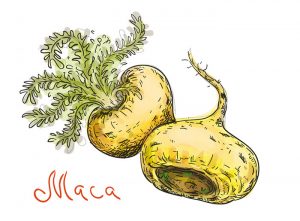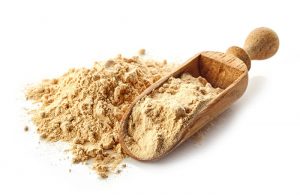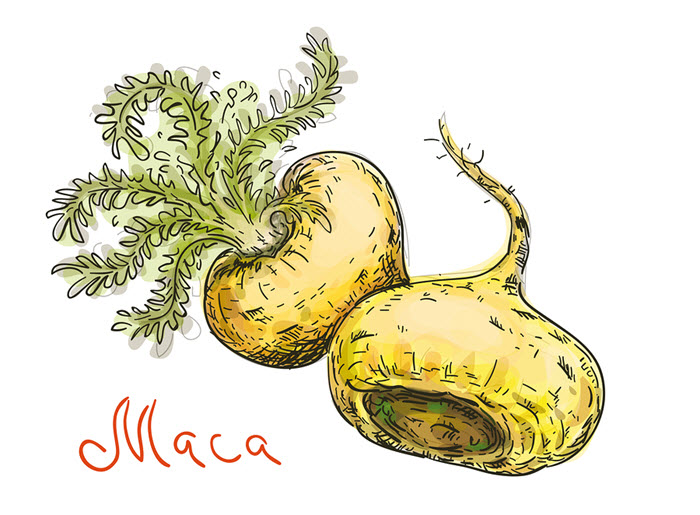Table of Contents
Maca (Lepidium meyenii) is a native Peruvian plant growing over 4,000 m (13,000 ft) high in the Andes mountains.
 Native Peruvians (pre-Inca) have cultivated Maca for at least 2,000 years. It is the only sustainable food crop that can grow in the harsh, cold conditions of the upper Andean plateau.
Native Peruvians (pre-Inca) have cultivated Maca for at least 2,000 years. It is the only sustainable food crop that can grow in the harsh, cold conditions of the upper Andean plateau.
Maca has the highest nutritional value of any food crop grown at this altitude. And is a staple diet of people living high in the Andes.
Modern Peruvian herbal medicine uses Maca as an immune booster, for anemia, tuberculosis, menstrual disorders, PMS, stomach cancer, sexual dysfunction, and for enhancing memory.
Maca is growing in popularity as a superfood and dietary supplement worldwide. And appears on our List of Nootropics because of its natural ability to boost cognition and memory.
Neurohackers are using Maca to increase energy, athletic endurance, mental clarity, boost libido in men and women, help tame PMS symptoms including mood, and chronic fatigue syndrome.
Here we’ll explore how Maca benefits your brain.
Maca helps:
- Neurotransmitters: Maca contains significant amounts of the amino acids arginine, serine, histidine, aspartic acid, glutamic acid, glycine, valine, phenylalanine, tyrosine, and threonine.
- Endurance & energy: Maca is used as a sports supplement by strength and endurance athletes to improve trial performance.[i] Likely due to better energy metabolism and improved antioxidant status.[ii]
- Learning & memory: Natives in the central Peruvian Andes traditionally had their children eat Maca to improve their performance in school.[iii] Likely due to Maca’s ability to boost acetylcholine and act as an antioxidant.[iv]
Overview
Maca (Lepidium meyenii) is a Peruvian plant of the brassica (mustard) family and Lepidium genus. It’s closest relative to other plants are rapeseed, mustard, turnip, cabbage, garden cress, and water cress.
 Maca grows naturally and is cultivated above 4,000 m (13,000 ft) in the Peruvian Andes. In a habitat of intense cold, intense sunlight, and strong winds.
Maca grows naturally and is cultivated above 4,000 m (13,000 ft) in the Peruvian Andes. In a habitat of intense cold, intense sunlight, and strong winds.
Maca has been used for well over 2000 years in the Andes for nutrition, and to enhance fertility in humans and animals. And has gained popularity worldwide over the last few years as a nootropic supplement and for its medicinal properties.
Traditionally, Maca is harvested and dried naturally for long-term storage. The hard Maca is then boiled in water to soften it and often used by the natives as juice.
Maca contains the amino acids leucine, arginine, phenylalanine, lysine, glycine, alanine, valine, isoleucine, glutamic acid, serine, aspartic acid, histidine, threonine, tyrosine, methionine, and proline.
Maca also contains the minerals iron, calcium, copper, zinc, and potassium.
And Maca contains the metabolites macaridine, macaene, macamides, thiohydantoins and maca alkaloids that are only found in this plant.[v]
Maca comes in three primary colors; yellow, red and black. Clinical studies have revealed that each color of Maca has different concentrations of metabolites. Which likely explains the different biological properties described for Maca.[vi]
How does Maca work in the brain?
Maca boosts brain health and function in several ways. But two in particular stand out.
- Maca boosts anandamide. The Maca compound macamide is structurally similar to anandamide, a neurotransmitter that binds to cannabinoid receptors in your brain.[vii]
Anandamide is known as the ‘bliss molecule’ and its name comes from the Sanskrit ‘ananda’ meaning joy, bliss or delight.
Studies have also revealed that Maca acts as fatty acid amide hydrolase (FAAH) inhibitor.[viii] FAAH is known to break down anandamide.[ix]
Researchers think that Maca provides it’s pharmacological effects by prolonging the presence of anandamide in your brain. And possibly binding to cannabinoid receptors.
Which may account for Maca’s ability to boost libido, regulate hormones, regulate metabolism, improve memory and act as an antidepressant.[x]
- Maca reduces anxiety & depression. Maca is well-known for boosting libido, sexual function, and reducing anxiety & depression in both men and women. But studies show Maca does this without having a direct effect on hormones.
Researchers at Victoria University in Australia conducted a randomized, double-blind, placebo-controlled trial with 29 postmenopausal women.
The women were given 3.3 g per day of Maca or a placebo for a total of 12 weeks in this crossover trial. Blood samples for estradiol, follicle stimulating hormone (FSH), sex hormone binding globulin (SHBG), thyroid stimulating hormone (TSH), full lipid profiles, glucose and serum cytokines were collected at 6 and 12 weeks. As well as a test to assess the severity of menopausal symptoms.
No differences were found in serum concentrations of hormones from the baseline. But there was a significant reduction in scores for anxiety and depression.
The study concluded that Maca at 3.3 g per day reduced anxiety and depression independent of hormone levels.[xi]
 Antidepressant activity has been shown with all three varieties of Maca; yellow, red, and black.[xii]
Antidepressant activity has been shown with all three varieties of Maca; yellow, red, and black.[xii]
Research has not proven this yet, but I speculate that this antidepressant activity including a boost in libido with Maca could be due to some of the amino acids it provides including tyrosine and GABA. And its antioxidant activity in the brain.
How things go bad
Most of us do not get the phytonutrients from food our body and brain need every day. The nutrients we need that contribute to neurotransmitter synthesis and release, and neuroprotection. Including preventing oxidative damage from free radicals.
A deficiency in these nutrients contributes to:
↑ Chronic inflammation
↑Accelerated aging
↑ High cholesterol and triglycerides
↑ Increased belly fat
↑ Insulin resistance
↑ Mitochondrial insufficiency and dysfunction
↑ Neurodegeneration
Maca is unique in the number and quantity of amino acids, and metabolites found only in this plant that supports mood, learning and memory, sexual well-being and overall health.
Maca benefits
Maca has been used as a staple food source by the native Inca and pre-Inca of the Central Peruvian Andes for thousands of years.
 The Inca first domesticated the plant over 2,000 years ago. And in 1553, Spanish conquistador Cieza de León recorded the first written description of Maca use.[xiii]
The Inca first domesticated the plant over 2,000 years ago. And in 1553, Spanish conquistador Cieza de León recorded the first written description of Maca use.[xiii]
Maca is rich in calcium, copper, Vitamins B1, B2 & B6, Vitamins C, iron, iodine, manganese, niacin, potassium, zinc, 20 different fatty acids (including linolenic, palmitic, and oleic acids), and 19 amino acids (including leucine, arginine, phenylalanine, histidine, threonine, tyrosine, and methionine), choline and GABA.
Maca also contains macamides and the alkaloid macaridine which are unique to this plant.
The Inca used Maca to boost energy and endurance, treat sexual dysfunction in men and women, support the immune system, tame menopause symptoms, menstrual issues, help memory and cognition, and even some cancers.
The macamides in Maca boost anandamide levels which increases mood and feelings of happiness.
Maca reduces hemoglobin which contributes to Chronic Mountain Sickness.
Maca protects against oxidative stress and free radical damage to brain cells.
Maca improves libido, sperm count and mobility, decreases anxiety & depression, lowers elevated blood pressure, increases energy levels and stamina, reduces PMS symptoms including improved mood, seems to boost cognitive function and memory, and reduces enlarged prostate.
Maca truly lives up to its “superfood’ label and may be considered an adaptogen.
How does Maca feel?
Maca has a unique smell that some find unpleasant. So if the smell offends you, I recommend doing what I do and make your own capsules. Or hide your Maca in a smoothie or juice.
 Supplementing with Maca should increase your energy levels. But not with the same rush you’d get from coffee or an energy drink. Instead, it feels more like you just woke up from a great night sleep.
Supplementing with Maca should increase your energy levels. But not with the same rush you’d get from coffee or an energy drink. Instead, it feels more like you just woke up from a great night sleep.
Many find that their stamina is better and their performance in any sport gets a boost with Maca.
Some report using Maca provides an increase in libido, and a noticeable reduction in PMS symptoms.
Younger neurohackers report less acne when using Maca. They’re more productive and everything just seems easier.
Older biohackers find that using Maca provides the energy boost they’re looking for. Without any anxiety or jitters, and no blood pressure issues.
If you are unfortunate enough to live in cold climate, Maca may help you combat the winter blues.
Your overall mood should be more upbeat and positive when using Maca as a nootropic supplement.
And using Maca daily keeps you regular.
Maca Clinical Research
Much of the research that has been promoted in the press has been done by a couple of supplement manufacturers. Attempting to promote Maca as an aphrodisiac and testosterone booster.
While it’s true that Maca boosts libido in many people it has no direct effect on hormones including testosterone.
The most trustworthy research has been done at Peruvian University. But most of it is done with animals. While helpful, you should read the studies closely and carefully to learn how Maca works in your brain and body.
The bottom-line will always be how well this nootropic supplement works for you.
Maca improves cognition
A study was conducted at Peruvian University to determine the effects of Yellow, Red and Black Maca on cognitive function and depression. The subjects were mice.
The animals were treated for 21 days in four groups; control, Yellow Maca, Red Maca, and Black Maca. Learning and depression were assessed during the study.
The study concluded that Black Maca was better as improving cognition and learning. All varieties of Maca showed antidepressant activity.[xiv]
Maca improves mood
A randomized, double-blind, placebo-controlled, crossover trial study was conducted at Victoria University in Australia with 14 postmenopausal women.
The women used 3.5 g per day of powdered Maca or a placebo for 12 weeks. Blood samples were analyzed for estradiol, follicle-stimulating hormone, luteinizing hormone, and sex hormone-binding globulin. And the women were assessed for severity of menopausal symptoms.
No differences were seen in the hormone tests. But researchers found that the women experienced a significant reduction in anxiety and depression while using Maca independent of estrogenic and androgenic activity.[xv]
At weeks 8 and 12, Red Maca improved mood in around 80% of subjects.
At week 12, more than 90% of the subjects consuming Red Maca manifested an increase in energy.
Another study with 175 people was conducted at Peruvian University who were given 3 g of either a placebo, Black or Red Maca daily for 12 weeks.
Half of the volunteers lived at low altitudes and the other half at high altitudes. Consumption of extracts of Red and Black Maca resulted in improvement in mood, energy, health-related quality of life scores, and Chronic Mountain Sickness.
The study found that effects on mood, energy and Mountain Sickness were better with Red Maca.[xvi]
Maca improves quality of life
The Health-Related Quality of Life (HRQL) questionnaire is universally used to assess things like physical, mental, emotional, and social functioning.
In other words, it assesses the positive aspects of a person’s life, such as positive emotion and life satisfaction.
A study conducted at Peruvian University with 50 subjects living 4,000 m (13,000 ft) above sea level in the central Peruvian Andes. Half the participants were Maca consumers and the other half did not use Maca.
The study was done with people living at a high altitude because of the prevalence of chronic mountain sickness (CMS).
Living at high altitude is associated with increased hemoglobin levels which in turn produces oxidative stress measured by the inflammatory marker interleukin-6 (IL-6).
Elevated IL-6 has been associated with aging, obesity, increased incidence of heart disease, and cognitive impairment.[xvii]
The researchers concluded after conducting the HRQL survey that consumption of Maca resulted in higher health status scores. And lower chronic mountain sickness (CMS) scores.[xviii]
Maca decreases SSRI-induced sexual dysfunction
One of the major side effects of taking SSRIs for treating depression is sexual dysfunction and reduced libido.
Researchers in the psychiatry department of Massachusetts General Hospital decided to see if they could figure out a way to counteract this problem.
The team conducted a double-blind, randomized study with 20 depressed (mostly) female patients (mean age 36 years) who were experiencing SSRI-induced sexual dysfunction.
The subjects were given either 1.5 g or 3 g of Maca per day for the duration of the study. The researchers found that the high dose group (3 g/day) had a significant improvement in relief from sexual dysfunction but not the 1.5/day group.
The study concluded that Maca root may alleviate SSRI-induced sexual dysfunction, and there may be a dose-related effect. Maca may also have a beneficial effect on libido.[xix]
Maca Recommended Dosage
 Recommended dosage of Maca for cognitive benefit is up to 5 grams per day.
Recommended dosage of Maca for cognitive benefit is up to 5 grams per day.
And like most nootropics, more does not work better. Too much Maca will upset your stomach.
Maca Side Effects
Maca is non-toxic and safe at recommended doses.
Higher doses of Maca can cause intestinal gas.
Raw Maca (not gelatinized) contains high amounts of glucosinolates which can cause problems if you have thyroid issues (i.e. hypothyroid).[xx]
No drug interactions or contraindications have been reported.
Type of Maca to Buy
Maca is available as a powder, capsules, flour, liquor and extract.
As a nootropic supplement it is typically used in powder form dissolved in water or a smoothie. Or in capsule form.
In general, Maca is available as dehydrated raw or dried powder, or gelatinized Maca powder.
Maca is gelatinized by boiling and pressurizing the raw material to remove fiber and make it easier to digest.
Maca is traditionally cooked by the Andean people. So gelatinized Maca works best for nootropic benefit. Ignore any advice that claims raw Maca is best. It’s just not true.
Maca is available in Yellow, Red or Black and each provides unique benefits. Black Maca has been shown to boost learning and memory. And all three types of Maca provide antidepressant benefits.
The purest Maca comes from high in the Andes of Peru. “Certified organic” is a bit of an oxymoron because all Maca grown in the Peruvian Andes is organic naturally.
Beware that Maca is also popular now in China and some Maca for export comes from that country. And should be avoided.
Nootropics Expert Recommendation
I recommend using Maca as a nootropic supplement.
Your body does not make Maca on its own. So to get its benefits you must take it as a supplement.
Maca can be particularly effective as an energy booster. And helps increase athletic endurance.
Maca may provide an increase in libido, and a noticeable reduction in PMS symptoms including better mood.
Supplementing with Maca is a great way to beat the winter blues.
And for many neurohackers, your overall mood should be more upbeat and positive when using Maca as a nootropic supplement.
Most clinical studies with Maca showed positive results with 3 g of Maca per day. You can and likely should use up to 5 g per day for cognitive benefit.









Join The Discussion - 72 comments
sherry
September 9, 2020
Do you know what Maca and Ashwaganda have in common that would make me overwhelmingly sleepy? I read how they are suppose to give energy and increase libido in women but not me, they put me in a sleepy fog.
David Tomen
September 10, 2020
Sherry, it’s difficult to say with Maca because it is loaded with amino acids which are precursors to all of your major neurotransmitters. It’s not possible to isolate what in Maca may be having this effect.
But with Ashwagandha, we know that it has GABA-mimicking effects much like benzodiazepines. So it sounds like you want to avoid anything that messes with GABA.
I recommend taking a more fundamental approach to increasing energy and see if that works for you. See this post on how to do that: https://nootropicsexpert.com/best-energy-supplements-to-buy/
Randall A. Little
August 29, 2020
If that’s the case how does it help people lower anxiety and stress or balance hormones if it only supports or raises SNS but not PNS. does that mean its not good for someone like me with already high stress hormone?
David Tomen
August 29, 2020
Randall, what “stress hormone” are you talking about? If it’s high cortisol try L-Theanine which has been shown to suppress excess cortisol levels.
Maca is loaded with amino acids and minerals which are cofactors or precursors to most major neurotransmitters in your brain. If your anxiety is caused by a neurotransmitter imbalance then it may help. Only way to find out is try it.
Raoul
May 22, 2020
Hi David,
Thanks for your research and web site.
I’m interested in the concentration of the recommended “up to 5g/day”. I found a supplement from NusaPure that says 40:1 concentration. Two questions:
1) Is the 5g/day based on natural concentration?
2) Does the process for concentration destroy any of the components?
Thanks!
David Tomen
May 22, 2020
Raoul, the dosage recommendation of up to 5 grams per day is for ordinary Maca powder and not an extract. Extracts are made to ensure higher concentrations of each compound found in the Maca is preserved.
Chris
May 11, 2020
Hello, Mr. Tomen,
The third paragraph up from the ‘Recommendation’ says that Red Maca is for learning and memory,
“Maca is available in Yellow, Red or Black and each provides unique benefits. Red Maca has been shown to boost learning and memory. And all three types of Maca provide antidepressant benefits.”
But it’s Black Maca that improves learning and memory. A typo…
David Tomen
May 13, 2020
Chris, you are correct. My mistake and it’s been corrected. Thank you sir!
Angel
July 29, 2019
Hi David, I very much enjoy the content of your site and have acquired your free ebook as well as purchased your Head First book. I am wondering if you ever plan on updating the content in that book, for example, this Maca article isn’t any of the books. Thanks again for the great site and info.
David Tomen
July 29, 2019
Angel, I plan on updating “Secrets” soon because that’s the easiest. As for Head First, I do plan a 2nd edition but it’s a major project so can’t promise it any time soon. Like in the next couple of months kind of soon. But stay tuned …
Sheryl Marshall
July 10, 2019
Hi I currently take Concerta at 18mg for inattentiveness and some hyperactivity(anxiety stops me being able to increase dose) with 5mg top up in the afternoon although trying to avoid the top up. I’ve been taking 4 – 5 500mg gelatinised red maca for around 3 months (with initial positive results, no so much now). I haven’t taken the top up 5mg methylphenidate in a few months although may consider added back in as extremely exhausted all the time, sleep isn’t the greatest and I’m about to return to my consultant as experiencing pain in lower legs, like a band is around them with occaisonal pain in tricep area of arm, actually noticed it running on the treadmill the other day after a period of relative inactivity. I did have some symptoms before adding in maca so suspect this is not the cause but can’t be sure. I wanted to know if this dose was correct or should try to increase or decrease? Additionally, wanted to get your opinion on anxiety – I guess it’s a kind of fight or flight response where I kind of feel a little euphoric, it’s not overly pleasant and happens when I’m really stressed and have to make a big decision, my head kind of feels fuzzy, can’t focus, feel like i’m drunk or buzzed but not in a good way, it can cause me to talk excessively and go off into tangents (I talk when I’m stressed, anxious, tired, to fill uncomfortable silences…) I did try high dose of Conceta 27mg I think but couldn’t tollerate as had extreme anxiety and palpatations. I do have bad circulation and aware of being cold alot, sometimes experiencing reynauds syndrome and breathlessness. It’s really difficult to treat anxiety and ADHD together and have been prescribed counted SSRI’s over the years with limited success. I wish to be med free as much as possible and currently do not take anything for anxiety. Any help would be greatly appreciated. Thank you, it so debiliating at times and really work hard to keep myself upbeat for my children.
David Tomen
July 10, 2019
Sheryl, if you follow the protocol in this post consistently while using methylphenidate, I think you’ll be amazed at the result: https://nootropicsexpert.com/best-nootropics-for-adhd-add/
Adena Moran
June 10, 2019
Hello. I’m searching for something natural for my husband, he has tried 2 different drugs from regular doctor and had side effects that were unpleasant from both. He is now in therapy and goes to see psych in July, for he is weary of natural things for some reason. I had him try ashwagandha, but he read something about it and got upset and stopped taking it. Granted ashwagandha is an herb, but Maca is a vegetable. I’m pretty sure he is bipolar, he gets very depressed, irritated, mad about everything, tiny things set him off, very low libido. He also found out he had lyme and was treated for 3 weeks on Doxycycline, and very low D3, which was treated and is normal now. I’d really like him to try maca. He also has stomach issues. Oh, they said he probably had lyme for years, and it affected his stomach, nerves, brain, et. Any recommendations would be greatly appreciated.
David Tomen
June 11, 2019
Adenam, here’s some homework for you. You mentioned that your husband tried two different drugs but stopped because of side effects.
Did either of the drugs work? Because if either one did then use Wikipedia and find out exactly how it works. Look for “pharmacology” or “mechanism of action”. Then search Nootropics Expert for a nootropic supplement that has the same mechanism of action.
Report back here if you need more help. Or schedule a consultation with me: https://nootropicsexpert.com/personal-consultations/
jorge hinojosa
March 31, 2019
Hello! Thank you for the information. I only have access to raw yellow macca, in powder, apparently organic. Do you know how should I cook it?
David Tomen
March 31, 2019
Jorge, not necessary to cook your raw yellow Maca. You can use it in its raw form. But too much can be hard on your digestive system. It’s certainly not dangerous. If you used it in a smoothie or mix it in juice you’d just use less than if it was gelatinized.
I’m no expert on cooking Maca but I imagine you can use it like you would regular flour. Try a search for raw Maca recipes and see what turns up.
jorge hinojosa
April 1, 2019
Thank you very much for your quick answer!